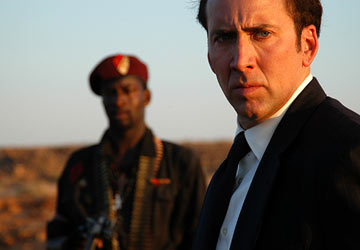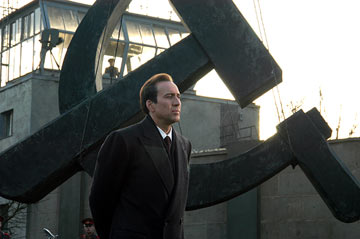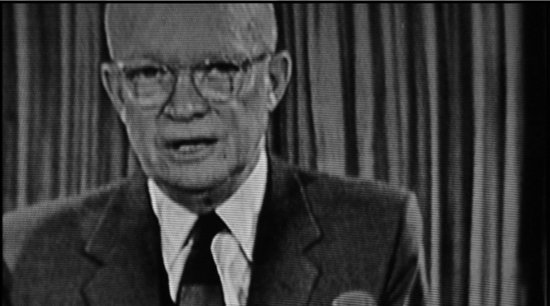A new report by Rep. Henry Waxman discloses some of Halliburton/KBR’s billing shadiness in Iraq. “In one case, the government’s contracting officials reported that KBR attempted to inflate its cost estimates by paying a supplier more than it was due. In another, KBR cut its cost estimates in half after it was pressed on its true expenses. In a third, KBR billed for work performed by the Iraqi oil ministry.“
Tag: Military-Industrial Complex
The “Black Room.”
“Placards posted by soldiers at the detention area advised, ‘NO BLOOD, NO FOUL.’ The slogan, as one Defense Department official explained, reflected an adage adopted by Task Force 6-26: ‘If you don’t make them bleed, they can’t prosecute for it.'” In related news, the NY Times exposes more allegations of shameful and disturbing Abu Ghraib-like detainee abuse conducted by “a shadowy military unit known as Task Force 6-26.” “Task Force 6-26 was a creation of the Pentagon’s post-Sept. 11 campaign against terrorism, and it quickly became the model for how the military would gain intelligence and battle insurgents in the future…Military and legal experts say the full breadth of abuses committed by Task Force 6-26 may never be known because of the secrecy surrounding the unit.”
Duke of Deceit.
As Randy “Duke” Cunningham faces sentencing today, federal investigators take a closer look at his connections to the Counterintelligence Field Activity (CIFA), “the Pentagon’s newest and fastest-growing intelligence agency.” “In pre-sentencing documents filed this week, prosecutors said that in fiscal 2003 legislation, Cunningham set aside, or earmarked, $6.3 million for work to be done ‘to benefit’ CIFA shortly after the agency was created. The contract went to MZM Inc., a company run by Mitchell J. Wade, who recently pleaded guilty to conspiring to bribe Cunningham.” Update: 8 years, 4 months.
Fight Club.
“In the councils of government, we must guard against the acquisition of unwarranted influence, whether sought or unsought, by the military-industrial complex. The potential for the disastrous rise of misplaced power exists and will persist. We must never let the weight of this combination endanger our liberties or democratic processes.” That flaming liberal Dwight Eisenhower’s somber farewell address to the nation is the historical and thematic anchor for Eugene Jarecki’s documentary Why We Fight, a sobering disquisition on American militarism and foreign policy since 9/11. In essence, Why We Fight is the movie Fahrenheit 9/11 should have been. Like F911, this film preaches to the choir, but it also makes a more substantive critique of Dubya diplomacy and the 9/11-Iraq switcheroo, with much less of the grandstanding that marred Moore’s earlier documentary (and drove right-wing audiences berzerk.)
Sadly, the basic tale here is all-too-familiar by now. Ensconced in Dubya’s administration from the word go, the right-wing think-tank crowd (Wolfowitz, Perle, Kristol, etc.) used the tragedy of 9/11 as a pretext to enact all their neocon fantasies (spelled out in this 2000 Project for a New American Century report), beginning in Iraq. Taken into consideration with Cheney the Military-Contractor-in-Chief doling out fat deals to his Halliburton-KBR cronies from the Vice-President’s office, and members of Congress meekly signing off on every military funding bill that comes down the pike (partly because, as the film points out, weapons systems such as the B-1 or F-22 have a part built in every state), it seems uncomfortably clear that President Eisenhower’s grim vision has come to pass.
To help him rake this muck, Jarecki shrewdly gives face-time not only to learned critics of recent foreign-policy — CIA vet Chalmers Johnson, Gore Vidal (looking unwell) — but also to the neocons themselves. Richard Perle is here, saying (as always) insufferably self-serving things, and Bill Kristol glows like a kid in a candy store when he gets to talk up his role in fostering Dubya diplomacy. (Karen Kwiatkowski, a career military woman who watched the neocon coup unfold within the corridors of the Pentagon, also delivers some keen insights.) And, when discussing the corruption that festers in the heart of our Capitol, Jarecki brings out not only Charles Lewis of the Center for Public Integrity but that flickering mirage of independent-minded Republicanism, John McCain. (In fact, Jarecki encapsulates the frustrating problem with McCain in one small moment: Right after admitting to the camera that Cheney’s no-bid KBR deals “look bad”, the Senator happens to get a call from the Vice-President. In his speak-of-the-devil grimace of bemused worry, you can see him mentally falling into line behind the administration, as always.)
To be sure, Why We Fight has some problems. There’s a central tension in the film between the argument that Team Dubya is a corrupt administration of historical proportions and the notion that every president since Kennedy has been party to an increasingly corrupt system, and it’s never really resolved satisfactorily here. Jarecki wants you to think that this documentary is about the rise of the Imperial Presidency across five decades, but, some lip service to Tonkin notwithstanding, the argument here is grounded almost totally in the Age of Dubya. (I don’t think it’s a bad thing, necessarily, but it is the case.) And, sometimes the critique seems a little scattershot — Jarecki seems to fault the Pentagon both for KBR’s no-bid contracts and, when we see Lockheed and McDonnell-Douglas salesmen going head-to-head, for bidding on contracts. (Still, his larger point is valid — As Chalmers Johnson puts it, “When war becomes that profitable, you’re going to see more of it.“)
Also, the film loses focus at times and meanders along tangents — such as the remembrances of two Stealth Fighter pilots on the First Shot Fired in the Iraq war, or the glum story of an army recruit in Manhattan looking to turn his life around. This latter tale, along with the story of Wilton Sekzer, a retired Vietnam Vet and NYPD sergeant who lost his son on 9/11 and wants somebody to pay, are handled with more grace and less showmanship than similar vignettes in Michael Moore’s film, but they’re in the same ballpark. (As an aside, I was also somewhat irked by shots of NASA thrown in with the many images of missile tests and ordnance factories. Ok, both involve rockets, research, and billions of dollars, but space exploration and war are different enough goals that such a comparison merits more unpacking.)
Nevertheless, Why We Fight is well worth-seeing, and hopefully, this film will make it out to the multiplexes. If nothing else, it’ll do this country good to ponder anew both a president’s warning about the “disastrous rise of misplaced power,” and a vice-president’s assurance that we’ll be “greeted as liberators.”
Send in Sgt. Brockovich.
“The water expert said he told company officials at the base that they would have to notify the military. ‘They told me it was none of my concern and to keep my mouth shut,’ he said.” Ah, the perks of a no-bid contract. As e-mail records prove, those patriots at Halliburton, Dick Cheney’s favorite corporate cronies, have been knowingly exposing some soldiers to contaminated water, despite being warned by their own employees about the danger. “Another former Halliburton employee who worked at the base, Ken May of Louisville, said there were numerous instances of diarrhea and stomach cramps.”
Armstrong-Gate comes to Baghdad.
“Even as the State Department and the United States Agency for International Development pay contractors millions of dollars to help train journalists and promote a professional and independent Iraqi media, the Pentagon is paying millions more to the Lincoln Group for work that appears to violate fundamental principles of Western journalism.” According to today’s NYT and in keeping with the Dubya administration’s penchant for rigging the media, it appears the Pentagon has been paying for planted propaganda in Iraqi newspapers. “‘You show the world you’re not living by the principles you profess to believe in, and you lose all credibility.‘”
Tryin’ to Throw Your Arms Around the World.
 “They say that ‘evil prevails when good men fail to act.’ It should just be ‘evil prevails.’” Andrew Niccol’s Lord of War, which I saw earlier this week, is basically an angrier, more sardonic kid brother to The Constant Gardener. But, while Gardener is probably a better-made work of cinema, I actually enjoyed myself more at Niccol’s film. At once a character study of an amoral arms dealer, a bitter tirade againt third world exploitation, and a dark comedy that may run too sour for some tastes, Lord of War is an above-average entrant in the satirical muckraking tradition. And its occasional preachiness is leavened by Nicolas Cage’s consistently-amusing and deftly-written performance, most of which is voiceover, at the center of the film.
“They say that ‘evil prevails when good men fail to act.’ It should just be ‘evil prevails.’” Andrew Niccol’s Lord of War, which I saw earlier this week, is basically an angrier, more sardonic kid brother to The Constant Gardener. But, while Gardener is probably a better-made work of cinema, I actually enjoyed myself more at Niccol’s film. At once a character study of an amoral arms dealer, a bitter tirade againt third world exploitation, and a dark comedy that may run too sour for some tastes, Lord of War is an above-average entrant in the satirical muckraking tradition. And its occasional preachiness is leavened by Nicolas Cage’s consistently-amusing and deftly-written performance, most of which is voiceover, at the center of the film.
Cage plays Yuri Orlov, a Ukrainian immigrant to Brighton Beach in the 1980s who, after an inadvertent run-in with the Russian mafia at a local cafe, realizes that guns, like the funeral business, is pretty much always a growth industry. Enlisting his more sensitive sibling (Jared Leto) as muscle and back-up (a.k.a. his “brother in arms”), Orlov embarks on a quest to arm the world and make mad bank doing it. Along the way, he woos a trophy wife (Bridget Moynahan), attracts the ire of both a more-established (and ostensibly more “moral” — he has politics as well as money in mind) rival (Ian Holm) and an idealistic, go-getter federal agent (Ethan Hawke), scavenges his former homeland after the fall of the USSR (essentially a free-for-all fire sale of tanks, munitions and ordnance), and finds himself in the company of increasingly more sadistic and unsettling despots (notably Eamonn Walker, doing a variation on Liberia’s Charles Taylor.)
 What keeps Lord of War moving at a brisk clip is Cage’s deadpan voiceover, which boasts an impressive arsenal of witty bon mots. Says Orlov of his mission, “There are over 550 million firearms in worldwide circulation. That’s one firearm for every twelve people on the planet. The only question is: How do we arm the other 11?” Of his clients in the ’80s: “I never sold to Osama bin Laden. Back then, he was always bouncing checks.” Of his (brief) attempt to go on the up-and-up: “Thank God there are still legal ways to exploit developing countries.” In short, if your sense of humor runs toward the dark and twisted, Niccol’s tightly-written script pays dividends.
What keeps Lord of War moving at a brisk clip is Cage’s deadpan voiceover, which boasts an impressive arsenal of witty bon mots. Says Orlov of his mission, “There are over 550 million firearms in worldwide circulation. That’s one firearm for every twelve people on the planet. The only question is: How do we arm the other 11?” Of his clients in the ’80s: “I never sold to Osama bin Laden. Back then, he was always bouncing checks.” Of his (brief) attempt to go on the up-and-up: “Thank God there are still legal ways to exploit developing countries.” In short, if your sense of humor runs toward the dark and twisted, Niccol’s tightly-written script pays dividends.
Whatsmore, unlike Gardener, which at times seemed to wallow in its piety, Lord of War cleverly juxtaposes its increasing contempt for Orlov’s vulturine livelihood against Cage’s natural amiability and his character’s rising fortunes (a la Richard III.) So, even as the story grows blacker, the audience has no place to go. We’re forced to empathize, at least to some degree, with Orlov’s attempt to achieve his own sick version of the American Dream on the backs of the Third World. Which, in the end, is Niccol’s point — We, too, are complicit in this story. Admittedly, the movie drops the ball somewhat in the last reel and veers too far toward polemic. (Of course, the same can be said of many quality film satires, including Catch-22 and Bamboozled.) But, until then, Lord of War is a disarmingly breezy jaunt through a highly-armed world and proof positive that, occasionally in “message movies,” honey catches more flies than vinegar.
Protecting the Trough.
“Known as a stickler for the rules on competition, Ms. Greenhouse initially received stellar performance ratings…But her reviews became negative at roughly the time she began objecting to decisions she saw as improperly favoring Kellogg Brown & Root, he said. Often she hand-wrote her concerns on the contract documents, a practice that corps leaders called unprofessional and confusing.” Via a colleague in the department, an Army contracting official is demoted for questioning no-bid contracts given to Halliburton, proving once again that Cheney conservatism has less to do with competition or capitalism than it does sheer, unmitigated cronyism.
From Gitmo with shame.
“‘Reasonable people always suspected these techniques weren’t invented in the backwoods of West Virginia,’ said Tom Malinowski, the Washington director of Human Rights Watch. ‘It’s never been more clear than in this investigation.'” A new report by military investigators finds the tactics of Abu Ghraib in full use at Guantanamo. “The report’s findings are the strongest indication yet that the abusive practices seen in photographs at Abu Ghraib were not the invention of a small group of thrill-seeking military police officers…they were used on Qahtani several months before the United States invaded Iraq.”
Kenny’s Boy.
The GOP attempts to break PBS grow murkier, as Dems unearth a right-wing stooge secretly on CPB President’s Kenneth Tomlinson’s payroll, assigned to track “bias” on Bill Moyer’s NOW. Nebraska Senator Byron “Dorgan said that data concluded in one episode of ‘Now’ that Senator Chuck Hagel, Republican of Nebraska, was a ‘liberal’ because he questioned the White House policy on Iraq and that a second ‘Now’ segment on financial waste at the Pentagon was ‘anti-Defense.’



